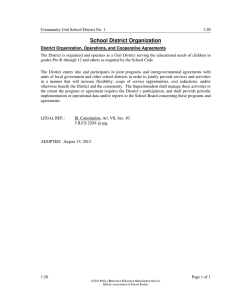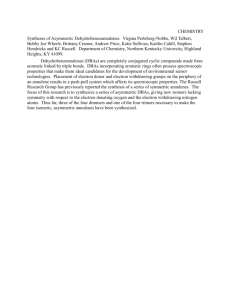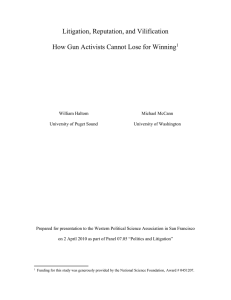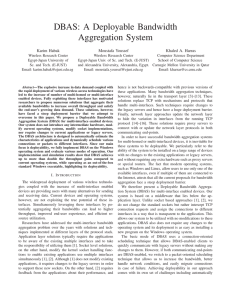07 February 2013 Dear Colleague
advertisement
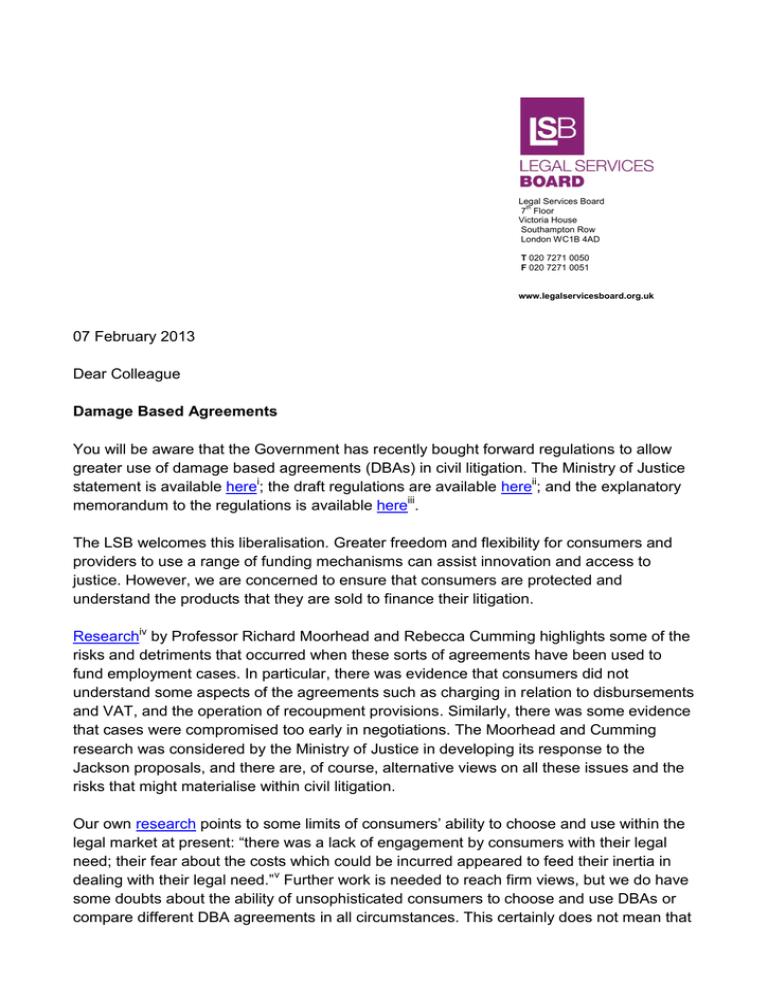
Legal Services Board th 7 Floor Victoria House Southampton Row London WC1B 4AD T 020 7271 0050 F 020 7271 0051 www.legalservicesboard.org.uk 07 February 2013 Dear Colleague Damage Based Agreements You will be aware that the Government has recently bought forward regulations to allow greater use of damage based agreements (DBAs) in civil litigation. The Ministry of Justice statement is available herei; the draft regulations are available hereii; and the explanatory memorandum to the regulations is available hereiii. The LSB welcomes this liberalisation. Greater freedom and flexibility for consumers and providers to use a range of funding mechanisms can assist innovation and access to justice. However, we are concerned to ensure that consumers are protected and understand the products that they are sold to finance their litigation. Researchiv by Professor Richard Moorhead and Rebecca Cumming highlights some of the risks and detriments that occurred when these sorts of agreements have been used to fund employment cases. In particular, there was evidence that consumers did not understand some aspects of the agreements such as charging in relation to disbursements and VAT, and the operation of recoupment provisions. Similarly, there was some evidence that cases were compromised too early in negotiations. The Moorhead and Cumming research was considered by the Ministry of Justice in developing its response to the Jackson proposals, and there are, of course, alternative views on all these issues and the risks that might materialise within civil litigation. Our own research points to some limits of consumers‟ ability to choose and use within the legal market at present: “there was a lack of engagement by consumers with their legal need; their fear about the costs which could be incurred appeared to feed their inertia in dealing with their legal need.”v Further work is needed to reach firm views, but we do have some doubts about the ability of unsophisticated consumers to choose and use DBAs or compare different DBA agreements in all circumstances. This certainly does not mean that we do not support the extension of DBAs. Rather we wish to explore if targeted and proportionate regulation may be needed to minimise any danger of either deliberate or inadvertent miss-selling. There may also be some public interest arguments to be considered in giving clients a clear and controllable stake in managing costs where DBAs are in use. For consumers to be able to choose between different providers, they are likely to need to be able to compare costs: that will not be possible if there is a lack of transparency and consistency on, for example, inclusion of VAT, disbursement and recoupment. It is arguable that, at least for unsophisticated consumers, providers should have to offer DBAs only on an „all in‟ fee – i.e. including disbursements and VAT alongside a clear and consistent presentation of their approach to recoupment. Law firms are likely to be able to assume the risk on disbursements because they can manage disbursements across volume and price risk into the success fee. The success fee cap in the regulations includes VAT and counsels‟ fees, but this does not avoid the risk that advertised prices will exclude it, and nor does it include disbursements beyond counsel fees. The risk with such an approach is, of course, that disbursement heavy cases are likely to be difficult to take on for smaller firms. Targeted regulation could make shopping around much more likely, increase downwards pressure on success fees and incentivise law firms to be cost conscious. Indeed, while in the short term such an approach might be seen as further reducing the cap set out in the legislation, in the longer term a more competitive market facilitated by this level of transparency may see the need for a statutory cap disappear. At this stage, we do not see the need for such a restrictive approach to be replicated for sophisticated consumers. We take the initial view that sophisticated consumers can make appropriate comparisons if they are given clear disclosure. If that is the case, then transparency requirements may be needed within regulatory arrangements as our research shows the importance of transparent pricing in aiding effective comparison. We are sure that the approach set out in this letter could be developed within an outcomes focused approach. It would meet the better regulation principles and be targeting a clear and present risk. The Government‟s Explanatory Note to its regulations states that “Only qualified legal representatives, who are subject to regulation by their professional bodies and whose conduct may be subject to challenge through those bodies, will undertake civil litigation (i.e. contentious business). It is therefore considered that, at this stage, further regulation is not required.” It is therefore important that the regulation that consumers (and indeed parliament) relies upon will be appropriate having regard to BRE principles, best regulatory practice and the regulatory objectives. Ahead of the LSB considering the matter formally we are seeking regulators‟ views and information as to how you currently plan to approach these risks. In particular: 1. What is your assessment of the risks? 2. How do these risks segment by consumer type and market sector (in line with Oxeravi framework) 3. What plans do you currently have to tackle the risks you have identified? 4. Would a consistent approach across all regulators be helpful? 5. Would s162 guidance from LSB assist in managing these regulatory risks? The changes envisaged in this legislation will take place on 1 April 2013. It is beholden upon all of us to be prepared and to that extent I wonder if you could reply by 22 February so that we can all progress the issue ahead of implementation. I am copying this letter to The Legal Services Consumer Panel, Citizens Advice, Which and Consumer Focus and placing a copy on our website. Yours Sincerely Crispin Passmore Strategy Director i http://www.justice.gov.uk/civil-justice-reforms/ http://www.legislation.gov.uk/ukdsi/2013/9780111533444 iii http://www.legislation.gov.uk/ukdsi/2013/9780111533444/pdfs/ukdsiem_9780111533444_en.pdf iv http://www.law.cf.ac.uk/researchpapers/papers/6.pdf v https://research.legalservicesboard.org.uk/wp-content/media/2012-Individual-consumers-legal-needs-report.pdf vi http://www.legalservicesboard.org.uk/news_publications/latest_news/pdf/a_framework_to_monitor_the_legal_services_sector.pdf ii

